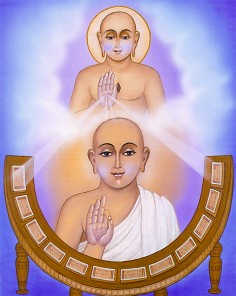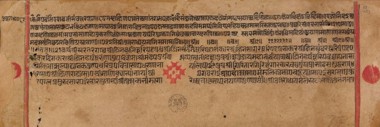Twenty-Second Lecture: Rathanēmi
In the town of Śauryapura[1] there was a powerful king, Vasudēva by name, who possessed the characteristic marks of a king. (1)
He had two wives, Rōhiṇī and Dēvakī; each of them had a beloved son, Rāma and Kēśava. (2)
In the town of Śauryapura there was (another) powerful king, Samudravijaya by name, who possessed the characteristic marks of a king. (3)
His wife was Śivā by name; and her famous son was the venerable Ariṣṭanēmi, the saviour of the world and the lord of ascetics. (4)
This Ariṣṭanēmi, who was gifted with an excellent voice and possessed the thousand and eight lucky marks of the body, was a Gautama, and his skin was black. (5)
His body was strong like that of a bull, and hard like steel; he was well proportioned, and had a belly like that of a fish.
Kēśava asked the girl Rājīmatī[2] in marriage for him. (6)
Now this daughter of an excellent king[3] was virtuous and well looking; she possessed all lucky marks of the body, and shone forth like the lightning Saudāmanī. (7)
Her father said to the powerful Vāsudēva: "Let the prince come here that I may give him my daughter." (8)
He had taken a bath containing all (lucky) herbs, and had performed the customary ceremonies; he wore a suit of heavenly clothes and was decked out with ornaments. (9)
Riding on the best mast elephant[4] of Vāsudēva he looked beautiful, like a jewel worn on the head. (10)
He sat under a raised umbrella, fanned by two cowries, and he was surrounded on all sides by a host of Daśārhas[5] and by a complete army drawn up in rank and file, while the heavenly sound of musical instruments reached the sky. (11, 12)
With such pomp and splendour the hero of the Vṛṣṇis started from his own palace. (13)
On his way he saw animals, kept in cages and enclosures, overcome by fear and looking miserable. (14)
Seeing them on the point of being killed for the sake of their flesh, and to be eaten afterwards, the great sage spoke to his charioteer[6] thus: (15)
"Why are[7] all these animals, which desire to be happy, kept in cages and enclosures?" (16)
Then the charioteer answered: "Lucky are these animals because at thy wedding they will furnish food for many people." (17)
Having heard these words, which announced the slaughter of many animals, the great sage, full of compassion and kindness to living beings, meditated thus: (18)
"If for my sake many living beings are killed, I shall not obtain happiness in the next world." (19)
Then the famous man presented the charioteer with his pair of earrings, his neck-chain, and all his ornaments. (20)
When he had formed his resolution, the gods descended (from heaven), according to the established custom, to celebrate, with great pomp together with their retinue, the event of his renunciation. (21)
Surrounded by gods and men, and sitting on an excellent palankin, the Venerable One left Dvārakā and ascended mount Raivataka.[8] (22)
On arriving at the park he descended from his excellent palankin, surrounded by a crowd of thousands, and then his renunciation took place, while the moon was in conjunction with Chitrā.[9] (23)
Then he himself plucked out his delightfully-perfumed, soft, and curled hair in five handfuls. (24)
And Vāsudēva said to that subdue of the senses, who had plucked out his hair: "O lord of ascetics, may you soon obtain what you wish and desire. (25)
"Increase in knowledge, faith, and right conduct, in forbearance and perfection!" (26)
In this manner Rāma and Kēsava, the Daśārhas, and many people paid homage to Ariṣṭanēmi and then returned to the town of Dvārakā. (27)
When the daughter of the king heard of the ordination of the Jina, laughter and gaiety forsook her, and she was overwhelmed with affliction.[10] (28)
Rājīmatī thought: "Shame upon my life, that I have been forsaken by him! it is better I should turn nun." (29)
Firm and decided she cut off her tresses which were black like bees and dressed with a brush and comb.[11] (30)
And Vāsudēva said to her who had cut off her hair, and subdued her senses: "Lady, cross the dreadful ocean of the Saṃsāra without difficulty!" (31)
When she had entered the order, the virtuous and very learned lady induced there many people, her relations and servants, to enter the order too. (32)
On her way to mount Raivataka it began to rain; her clothes being wet, she entered a cave and waited there in the darkness while it was raining. (33)
She took off her clothes and was naked as she was born, thus she was seen by Rathanēmi,[12] whose (peace of) mind (thereby) disturbed; and afterwards she saw him. (34)
She was frightened when she discovered herself alone with the monk; folding her arms over her breast she sank down trembling. (35)
When the prince, Samudravijaya's son, saw her frightened and trembling, he spoke the following words: (36)
"I am Rathanēmi, O dear, beautiful, sweetly-speaking lady! Do accept me for your lover, O slender one,[13] you shall have no cause to complain. (37)
"Come, let us enjoy pleasures, for it is a rare chance to be born a human being; after we have enjoyed pleasures, we shall enter on the path of the Jinas." (38)
When Rājīmatī perceived that Rathanēmi's strength of will was broken, and temptation had got the better of him, she did not lose her presence of mind and defended her Self on that occasion. (39)
The daughter of the best king, true to self-control and her vows, maintained the honour of her clan and family, and her virtue, and spoke to him: (40)
"If you owned the beauty of Vaiśramaṇa,[14] the pleasing manners of Nalakūbara,[15] if you were like Purandara[16] himself, I should have no desire for you. (41)
"Fie upon you, famous knight, who want to quaff the vomited drink for the sake of this life; it would be better for you to die.[17] (42)
"I am the daughter of the Bhōga-king,[18] and you are an Andhakavṛṣṇi; being born in a noble family let us not become like Gandhana-snakes;[19] firmly practise self-control! (43)
"If you fall in love with every woman you see, you will be without hold like the Haṭha-plant,[20] driven before the wind. (44)
"As a herdsman or a keeper of goods does not own the things (he has the care of), so you will not truly own Śramaṇahood." (45)
Having heard these well-spoken words of the virtuous lady, he returned to the Law like an elephant driven by the hook.[21] (46)
Protected in thoughts, words, and acts, subduing his senses and keeping the vows, he practised true Śramaṇahood throughout life. (47)
After practising severe austerities both of them became Kēvalins, and having completely annihilated their Karman, they reached the highest perfection. (48)
Thus act the enlightened, the wise, the clever ones; they turn from pleasures as did this best of men.[22] (49)
Thus I say.
According to the Brahmanical account Vasudēva lived in Mathurā. The name given to the town by the Jainas is apparently derived from Śauri, an epithet of Kṛṣṇa, whose grandfather was Śūra. Soriyapura may be Śaurikapura or Śauryapura. The latter rendering adopted by our commentators is based on a wrong etymology.
Rāīmai, Rāimaī, and Rāyamatī are the forms of her name in Prākṛt; the spellings Rājimatī and Rājamatī are also met with in Sanskrit.
viz. Ugrasēna. He was placed on the throne by Kṛṣṇa on the death of Kaṃsa, cf. Viṣṇu Purāṇa V, 21. He and Dēvaka were the sons of āhuka, Kaṃsa was a son of Ugrasēna, and Dēvakī a daughter of Dēvaka, loc. cit. IV, 14. According to the legend of Kṛṣṇa, as told by the Brahmans and Jainas, Jarāsandha afterwards repeatedly attacked Mathurā. Kṛṣṇa therefore built Dvārakā on the shore of the western ocean, and sent thither the Yādava tribe, loc. cit. V, 22 and 23. The events narrated in the text must be understood to have occurred in Dvārakā, as is evident from verse 21.
Gandhahastin, an elephant of the best class, whose very smell is sufficient, as is believed, to frighten common elephants, see verse 55.
In verse 10 Ariṣṭanēmi rides on an elephant, but in the sequel he is supposed to travel in a car. Unless the poet can be charged with having made this blunder, which I think just possible, verse 10 must be considered a later addition.
The form of the verb acchahiṃ for acchanti is worthy of note, because hiṃ as ending of the third person plural belongs to Apabhraṃśa. It is interesting to find a true Apabhraṃśa form in a text so old as ours, for it seems to prove that at all times Apabhraṃśa went along with the common Prākṛt, a vulgar or low with a high middle-Indian language.
Raivataka is mount Girnār in Kaṭhiawāḍ. The hill is one of the most sacred places of the Jainas, and is covered with temples of the Jinas. It is also sacred to the Hindus on account of its connection with the history of Kṛṣṇa. The poetical description of mount Raivataka forms the subject of the fourth sarga of the Śiśupālavadha by Māgha.
The lamentation of Rājīmatī on her husband's becoming an ascetic forms the subject of a curious Sanskrit poem called Mēmidūtakāvya, by Vikrama, son of Sanghaṇa, which has been edited in the Kāvyamālā of 1886. It is what is technically called a samasyāpūraṇa or gloss. The last line of each stanza is taken from the Mēghadūta of Kālidāsa, and the first three lines are added by the poet to make the whole fit the circumstances of his tale.
Kuccaphaṇaga, in Sanskrit kūrchaphanaka. According to the scholiasts phanaka is a comb made of bamboo.I have translated, "cut off her tresses," but literally it is: "plucked out her hair." However, I do not think that women also are to pluck out their hair.
Rathanēmi was her husband's elder brother. According to a legend told in Haribhadra's ṭīkā of the Daśavaikālika Sūtra (see Leumann in the Journal of the German Oriental Society, vol. 46, p. 597), Rathanēmi fell in love with Rājīmatī. But that lady in order to make him see his wrong, vomited a sweet beverage she had drunk, in a cup and offered it him. On his turning away with disgust she explained to him her meaning: she too had been vomited, as it were, by Ariṣṭanēmi, notwithstanding which he wanted to have her. She then taught him the Jaina creed, and he became a monk.
Suyaṇu = sutanu. This may, however, be a proper name, a synonym of Rājīmatī, for according to the Harivaṃśa 2029 and the Viṣṇu Purāṇa IV, 14, Sutanu was a daughter of Ugrasēna.
The verses 42, 43, 44, 46 have been received in the Daśavaikālika Sūtra II, 7-10, see Leumann's edition of that Sūtra quoted in the note, p. 116. A metrical German translation will be found in the same place.
On the Bhōgas see p. 71, note 2. It is perhaps here misspelt for Bhōja. In the Viṣṇu Purāṇa, Kaṃsa, Ugrasēna's son, is twice called Bhōjarāja (see Wilson's translation, ed. Hall, vol. iv, pp. 260, 271), in contradiction to the common tradition which makes him an Andhaka, compare Patañjali on Pāṇini IV, 1, 114.
There are said to be two kinds of snakes, the gandhana and the agandhana. The former can be made to suck the poison from the wound they have inflicted; the other will rather die than do so. Cf. Leumann, loc. cit., p. 597, note *.
 Ganadhar Sudharma Swami
Ganadhar Sudharma Swami
